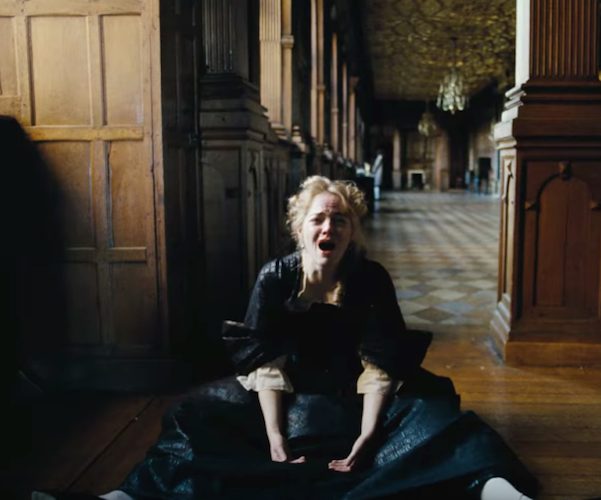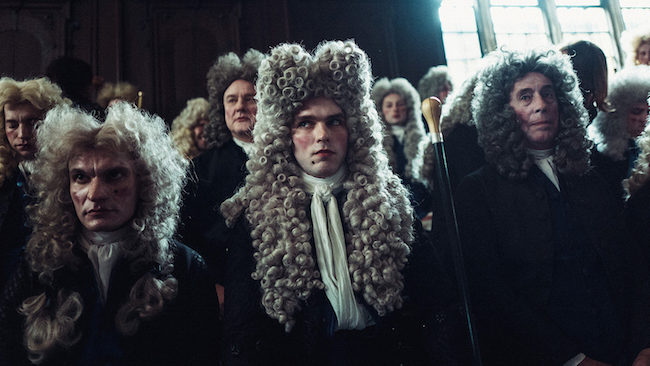Film Review: “The Favourite” — Hysterical History
The Favourite may be a raucous historical lampoon — but it is a timely one.
The Favourite, directed by Yorgos Lanthimos. Begins screening November 27 at the Landmark Kendall Square Cinema and AMC Loews Boston Common 19.

Emma Stone having a temper tantrum in “The Favourite.”
By Tim Jackson
Yorgos Lanthimos, the director of Dogtooth, The Lobster, and Killing of a Sacred Deer, specializes in creating extravagant worlds, movies that teem with lush set pieces, beautiful architecture, and outrageous characters. The premise of his earlier films requires a conscious (sometimes determined) suspension of disbelief. In his new effort, The Favourite, the Greek born director reimagines 18th-century England during the reign of Queen Anne. The setting is a royal estate filled with hidden doorways and endless candlelit hallways, a space populated by immobile pasty-faced servants and aristocrats in massive curling wigs. At the center of the narrative is a pampered court addicted to eccentric pastimes and ceremonies. It is ruled over by a demented queen. The Favourite is a farce and Lanthimos’ most accessible film so far.
The queen (Olivia Colman) is not well. She is attended to by her dear friend Lady Sarah Churchill (Rachel Weisz), who is wooing and then exploiting the queen’s favor for her own nefarious purposes. One evening Sarah’s cousin Abigail (Emma Stone) arrives. She’s fallen from royal grace, bereft of money and status. Sarah heartlessly assigns her cousin to scullery maid duties. But Abigail is far too ambitious and clever to remain among the lower classes; she plots a way to weasel into the queen’s favor. Sarah has bigger ambitions and the pesky cousin is competition — so the battle is on. One of Lady Churchill’s ambitions is to keep the country’s troops at war for as long as possible. That conveniently keeps her husband the Duke of Marlborough, a gifted military leader, in the field and a safe distance away. His absence makes manipulating the queen so much easier. Sarah’s self-serving goal is to have the military campaign financed by doubling taxes on the populace, much to the dismay of the queen’s finance minister, Robert Harley (Nicholas Hoult).
The story’s premise is loosely based on fact: Queen Anne has been referred to as “The Lesbian Queen,” particularly for her alleged affair with Lady Sarah Churchill, the Duchess of Marlborough, on whom she doted. Sarah was beautiful, conniving, and prone to affairs. She had the monarch enthralled and took full advantage of her position, often having to be reminded that she was not the queen. In real life Sarah had a quiet cousin named Abigail who wormed her way into the queen’s favor, leaving Lady Churchill humiliated and defeated.

A lineup of the bewigged buffoons in “The Favourite.”
This was a marvelously decadent period in British history, perfect fodder for Lanthimos’s surreal imagination, which transforms the conniving battles between Sarah and Abigail into wacky entertainment. A sampling of the amusements in this fantasy English court: the queen’s duck and lobster races; bewigged nobles kill an afternoon by gleefully tossing ripe tomatoes at a naked giggling man. An additional treat: the costumes are exquisite exaggerations of 18th-century garb.
Filled with infirmities, including gout, the eccentric queen is easily swayed by whoever soothes her ego and her aching body. For some reason she keeps hutches of bunnies in her room and they are encouraged to roam freely about. Screenwriters Deborah Davis and Tony McNamara have come up with amusingly absurd dialogue, but the director’s wild imaginings are the real star of The Favourite. The queen and her royal court are an absurd bunch, but Stone and Weisz go at each other with dark comic seriousness. Weisz’s determination plays well against Stone’s tough innocence. Approached one night by Lord Masham (Joe Alwyn) while she is in bed, Stone’s Abigail leans back and calmly asks, “Are you here to rape me or seduce me?” She proceeds to place him under her control; Abigail’s also good with her fists.
Olivia Colman, who also plays Queen Elizabeth II beginning with the third season of the TV series The Crown, won Best Actress at the Venice Film Festival for her turn as Queen Anne. The actress is amazingly nimble; she can go from commanding to featherbrained in an instant. At one point, Coleman’s Queen Anne declares to her followers: “We must fight for what we fight for.” Those vacuous words, the hyper-sycophantic behavior of the court, and the unprincipled struggle among vicious fools for the favor of an addled monarch take on an uneasy resonance in our own political moment. This may be a raucous historical lampoon — but it is a timely one.
Tim Jackson was an assistant professor of Digital Film and Video for 20 years. His music career in Boston began in the 1970s and includes some 20 groups, recordings, national and international tours, and contributions to film soundtracks. He studied theater and English as an undergraduate, and has also has worked helter skelter as an actor and member of SAG and AFTRA since the 1980s. He has directed three feature documentaries: Chaos and Order: Making American Theater about the American Repertory Theater; Radical Jesters, which profiles the practices of 11 interventionist artists and agit-prop performance groups; When Things Go Wrong: The Robin Lane Story, and the short film The American Gurner. He is a member of the Boston Society of Film Critics. You can read more of his work on his blog.

